Don't wanna be here? Send us removal request.
Text

//;lkbjcgxfdvfbghvbn,/
0 notes
Text

In the hotel industry, smooth activities are important, and effective inventory management is essential. Inventory software for hotels, such as AlignBooks, will be essential in this case because it provides an exact and trustworthy solution. (Book a free demo.)
0 notes
Text
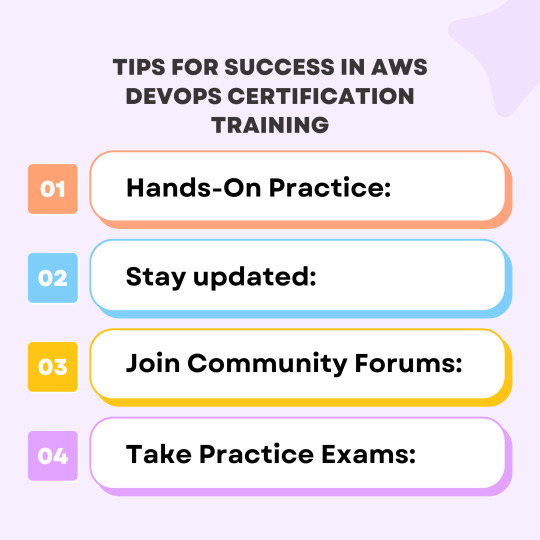
Our AWS DevOps Engineer Certification Training equips you with the essential skills to excel in cloud-based DevOps environments. Dive into the intricacies of AWS services and learn how to leverage them for seamless infrastructure automation, continuous integration, and deployment.
0 notes
Text
The Complete Guide to AWS DevOps Engineer Certification Training, Mastering DevOps in the Cloud
Introduction:
In the fast-paced world of IT, where agility and efficiency reign supreme, the adoption of DevOps practices has become indispensable for organizations aiming to stay ahead of the curve. And when it comes to implementing DevOps in the cloud, Amazon Web Services (AWS) stands out as a leading platform of choice. AWS offers a suite of robust tools and services tailored for DevOps, empowering professionals to streamline software delivery, enhance collaboration, and drive continuous improvement.
If you're looking to validate your expertise in AWS DevOps and elevate your career prospects, pursuing the AWS DevOps Engineer Certification is a strategic move. This comprehensive certification not only validates your technical proficiency but also equips you with the skills needed to architect, build, and operate applications on AWS using DevOps principles and best practices.
Understanding AWS DevOps Certification
The AWS DevOps Engineer Certification is designed for professionals who possess experience in both development and operations roles and are proficient in deploying and managing applications on the AWS platform. This certification validates your ability to automate key processes, implement continuous integration and continuous delivery (CI/CD), and utilize AWS services to optimize resource utilization and scalability.
Why Pursue AWS DevOps Certification?
1. Industry Recognition:
Achieving AWS DevOps certification demonstrates your commitment to mastering DevOps practices on one of the most widely adopted cloud platforms globally. It serves as a testament to your expertise and can significantly enhance your credibility in the eyes of employers and peers.
2. Career Advancement:
In today's competitive job market, AWS DevOps certification can set you apart from the crowd and open doors to lucrative career opportunities. DevOps engineers are in high demand as organizations seek to accelerate their software delivery pipelines and improve operational efficiency.
3. Mastery of AWS Tools and Services:
Through the certification process, you'll gain in-depth knowledge of various AWS tools and services essential for implementing DevOps practices effectively. From AWS CodePipeline and AWS CodeDeploy to AWS CloudFormation and AWS Elastic Beanstalk, you'll become proficient in leveraging these services to automate infrastructure provisioning, deployment, and management.
4. Hands-On Experience:
The AWS DevOps certification training is highly practical, allowing you to apply theoretical concepts to real-world scenarios. You'll work on hands-on labs, case studies, and projects that simulate common DevOps challenges, giving you the confidence and expertise needed to excel in your role.
What Does the AWS DevOps Certification Training Cover?
1. AWS Fundamentals:
The training begins with an overview of essential AWS concepts and services, ensuring you have a solid understanding of the AWS cloud platform's fundamentals.
2. DevOps Principles:
You'll delve into the core principles of DevOps, including collaboration, automation, continuous integration, continuous delivery, and infrastructure as code (IaC).
3. CI/CD Pipelines:
Learn to design, implement, and manage CI/CD pipelines using AWS services such as AWS CodePipeline, AWS CodeBuild, and AWS CodeDeploy.
4. Infrastructure as Code (IaC):
Master the art of defining and managing infrastructure using code with AWS CloudFormation, Terraform, and other IaC tools.
5. Monitoring and Logging:
Explore how to monitor application performance, collect and analyze logs, and leverage AWS services like Amazon CloudWatch for proactive monitoring and troubleshooting.
6. Security Best Practices:
Understand security best practices for DevOps in the cloud, including identity and access management (IAM), encryption, compliance, and security automation.
Tips for Success in AWS DevOps Certification Training
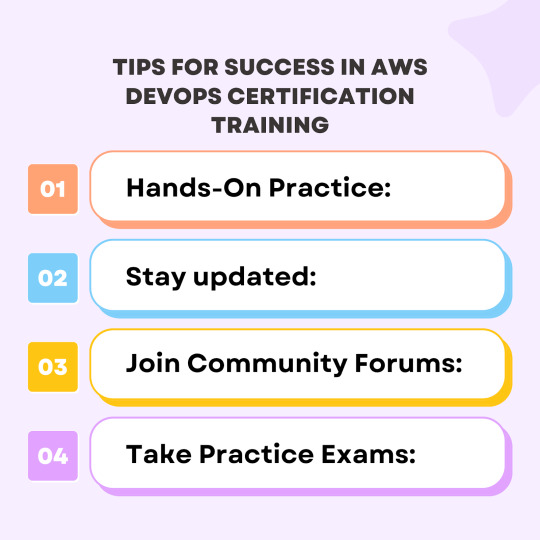
1. Hands-On Practice:
Don't just rely on theoretical knowledge. Practice implementing DevOps workflows and utilizing AWS services in real-world scenarios to solidify your understanding.
2. Stay updated:
The cloud landscape evolves rapidly, so stay updated with the latest AWS services, features, and best practices through blogs, forums, and official AWS documentation.
3. Join Community Forums:
Engage with the AWS community by participating in forums, user groups, and online discussions. Networking with fellow professionals can provide valuable insights and support throughout your certification journey.
4. Take Practice Exams:
Familiarize yourself with the exam format and assess your readiness by taking practice exams and quizzes. Identify areas where you need improvement and focus your study efforts accordingly.
Conclusion:
Embarking on the journey to become an AWS DevOps Engineer is both challenging and rewarding. By obtaining the AWS DevOps certification, you not only validate your expertise but also position yourself as a valuable asset to organizations seeking to harness the power of DevOps in the cloud. With comprehensive training, hands-on experience, and dedication to continuous learning, you'll be well-equipped to thrive in today's dynamic IT landscape.
Are you ready to take the next step in your DevOps journey? Explore AWS DevOps certification training programs and unlock new opportunities for career growth and success.
0 notes
Text

The Amazon Web Services (AWS) Certification verifies your proficiency with cloud computing and highlights your aptitude for efficiently designing, implementing, and overseeing applications on the AWS platform. Whether you're a budding cloud architect, developer, or sysops administrator, the AWS Certification provides a method to prove your abilities, improve your chances of landing a job, and get access to fascinating cloud computing options.
0 notes
Text
Getting Around the Cloud: Opening Doors with an AWS Certification
In today's tech-driven world, cloud computing has become the backbone of countless industries, revolutionizing the way businesses operate and individuals access resources. Among the leading providers in this domain, Amazon Web Services (AWS) stands out as a powerhouse, offering a comprehensive suite of cloud services to businesses and individuals worldwide. As the demand for AWS expertise continues to soar, obtaining an AWS certification has emerged as a pivotal step for professionals aiming to excel in the cloud computing landscape.
Understanding AWS Certification
AWS certification validates an individual's expertise in various AWS services, demonstrating their ability to design, deploy, and manage applications on the AWS platform effectively. Whether you're an IT professional, developer, or solutions architect, earning an AWS certification can significantly enhance your career prospects and credibility in the industry.
Why pursue AWS certification?

1. Industry Recognition:
AWS certifications are widely recognized across industries, making certified professionals highly sought after by employers. Holding an AWS certification demonstrates your commitment to staying abreast of the latest cloud technologies and best practices.
2. Career Advancement:
With the rapid adoption of cloud technologies, organizations are actively seeking skilled professionals to drive their cloud initiatives. AWS certification opens doors to a myriad of job opportunities, ranging from cloud architect to cloud developer, offering lucrative salary prospects and career growth.
3. Hands-on Experience:
AWS certification courses provide hands-on experience with real-world scenarios, allowing candidates to gain practical insights into deploying and managing applications on the AWS platform. This practical knowledge is invaluable for tackling real-world challenges in cloud environments.
4. Stay competitive:
As the cloud computing landscape evolves, staying competitive requires continuously updating your skills and staying abreast of emerging trends. AWS certification ensures that you remain competitive in the job market by validating your expertise in the latest AWS services and technologies.
Types of AWS Certifications
AWS offers a diverse range of certifications catering to different roles and skill levels. Some of the prominent AWS certifications include:
1. AWS Certified Solutions Architect:
Designed for individuals who design distributed systems on the AWS platform, the AWS Certified Solutions Architect certification validates your ability to architect scalable, secure, and reliable applications on AWS.
2. AWS Certified Developer:
This certification is tailored for developers who design and maintain applications on the AWS platform. It demonstrates your proficiency in developing, deploying, and debugging cloud-based applications using AWS services.
3. AWS Certified SysOps Administrator:
Ideal for system administrators and operations professionals, this certification validates your technical expertise in managing and operating systems on AWS. It covers various operational tasks, such as provisioning, managing, and securing AWS resources.
4. AWS Certified DevOps Engineer:
Targeting professionals who implement and automate continuous delivery systems and methodologies on AWS, this certification validates your expertise in DevOps practices, including automation, monitoring, and logging on AWS.
5. AWS Certified Cloud Practitioner:
Geared towards individuals with non-technical backgrounds or those new to cloud computing, this entry-level certification provides a foundational understanding of AWS Cloud, covering its basic concepts, services, and architectural principles.
How to Prepare for AWS Certification
1. Enroll in AWS courses:
There are a myriad of online courses and training programs available to help you prepare for AWS certification. These courses cover various topics, ranging from AWS fundamentals to advanced topics specific to each certification track.
2. Hands-on Labs and Projects:
Practical experience is crucial for mastering AWS concepts and services. Engage in hands-on labs and projects to apply theoretical knowledge in real-world scenarios, gaining practical insights and troubleshooting skills along the way.
3. Practice with the AWS Free Tier:
AWS offers a Free Tier option that allows you to explore and experiment with various AWS services at no cost. Leverage the AWS Free Tier to practice your skills, experiment with different configurations, and gain practical experience without incurring any expenses.
4. Utilize practice exams:
Practice exams are invaluable tools for assessing your readiness and identifying areas for improvement. Familiarize yourself with the format and types of questions commonly found in AWS certification exams by taking practice exams available through reputable platforms.
5. Stay updated:
The cloud computing landscape is constantly evolving, with AWS introducing new services and features regularly. Stay updated with the latest AWS announcements, whitepapers, and documentation to ensure your knowledge remains current and relevant.
Conclusion:
In conclusion, AWS certification offers a gateway to unlocking a world of opportunities in the rapidly expanding field of cloud computing. Whether you're a seasoned IT professional or a newcomer to the industry, obtaining an AWS certification can propel your career to new heights, opening doors to exciting job roles and rewarding challenges. By investing in AWS certification and staying abreast of emerging trends, you can position yourself as a valuable asset in today's competitive job market and contribute to the continued innovation and growth of cloud computing.
So, why wait? Embark on your AWS certification journey today and chart a course toward a brighter, more prosperous future in the cloud!
0 notes
Text
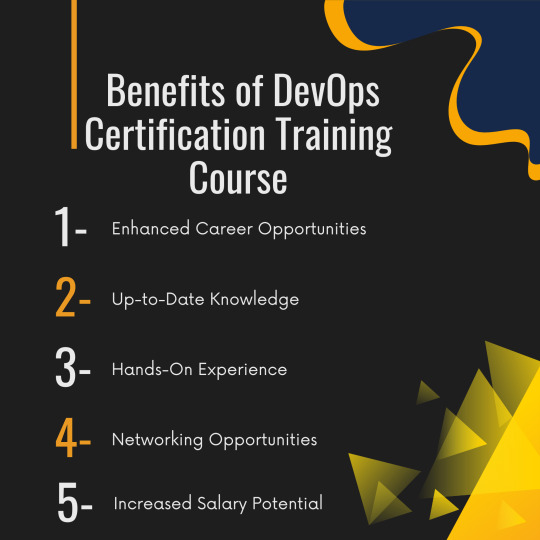
Take advantage of our extensive DevOps Certification Training Course to learn more about the revolutionary field of DevOps. Achieve certification as a DevOps expert by gaining practical experience, mastering necessary tools, and learning cutting-edge practices. Advance your profession and take advantage of new chances in IT operations and software development. Enroll right away to start down the path to a better future.
0 notes
Text
Certification Program for DevOps: A Comprehensive Guide to Unlocking the Future of IT
Introduction:
In today's fast-paced digital landscape, businesses are constantly striving to innovate, scale, and deliver products and services faster than ever before. This need for agility and efficiency has given rise to DevOps, a cultural and professional movement that emphasizes collaboration, automation, and integration between software development and IT operations teams. As organizations embrace DevOps principles, the demand for skilled professionals who can navigate this paradigm shift continues to grow. This is where DevOps certification training courses come into play.
What is the DevOps course?
DevOps course is designed to equip professionals with the knowledge, skills, and tools needed to implement DevOps practices within their organizations successfully. From understanding the fundamental principles of DevOps to mastering advanced techniques in automation and continuous integration/continuous deployment (CI/CD), these courses cover a wide range of topics essential for aspiring DevOps engineers.
DevOps Certification: Why It Matters
In the competitive job market, DevOps certification can give professionals a competitive edge by validating their expertise and commitment to mastering DevOps principles. Employers often look for candidates with recognized certifications, such as:
DevOps Foundation Certification: This certification validates a candidate's understanding of core DevOps principles, terminology, and practices.
AWS Certified DevOps Engineer: Offered by Amazon Web Services (AWS), this certification demonstrates proficiency in implementing and managing DevOps practices on the AWS platform.
Docker Certified Associate: Docker is a popular containerization platform widely used in DevOps environments. This certification validates proficiency in Docker's core concepts and practices.
Certified Kubernetes Developer (CKA): Kubernetes is an open-source container orchestration platform. CKA certification demonstrates expertise in Kubernetes installation, configuration, and management.
Microsoft Certified: Azure DevOps Engineer Expert: This certification validates skills in designing and implementing DevOps practices on Microsoft Azure, including CI/CD pipelines, version control, and infrastructure as code (IaC).
Benefits of DevOps Certification Training Course
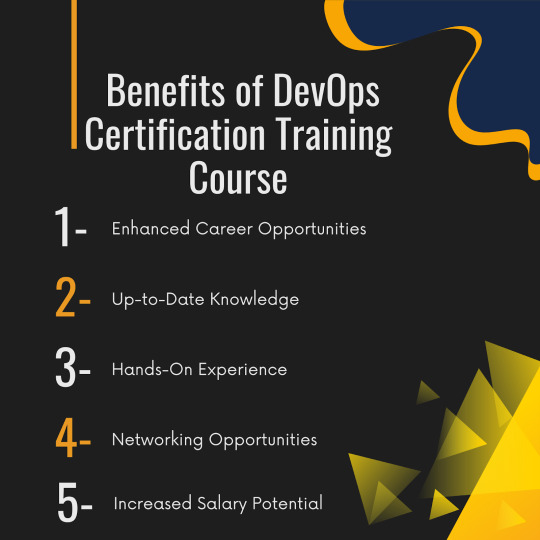
1. Enhanced Career Opportunities:
DevOps professionals are in high demand across industries, ranging from technology and finance to healthcare and retail. By obtaining DevOps certification, individuals can position themselves as sought-after candidates for roles such as DevOps engineer, automation architect, site reliability engineer (SRE), and more.
2. Up-to-date Knowledge:
DevOps certification training courses are continuously updated to reflect the latest trends, tools, and best practices in the industry. By enrolling in a reputable course, professionals can stay ahead of the curve and ensure that their skills remain relevant in a rapidly evolving IT landscape.
3. Hands-On Experience:
Many DevOps certification training programs offer hands-on labs, case studies, and real-world projects that allow participants to apply their learning in practical scenarios. This experiential learning approach not only reinforces theoretical concepts but also helps learners build confidence in their abilities.
4. Networking Opportunities:
Joining a DevOps certification training course provides professionals with the opportunity to connect with peers, industry experts, and potential employers. Networking within the DevOps community can lead to valuable collaborations, mentorship opportunities, and job referrals.
5. Increased Salary Potential:
According to industry reports, DevOps professionals command lucrative salaries compared to their counterparts in traditional IT roles. By investing in DevOps certification training, professionals can position themselves for higher-paying roles and greater earning potential over time.
Choosing the Best DevOps Certification Course
With numerous DevOps certification training courses available both online and in-person, selecting the right one can be challenging. Here are some factors to consider when evaluating different options:
- Accreditation: Look for courses offered by reputable organizations or training providers that are accredited by recognized bodies in the industry.
- Curriculum: Review the course curriculum to ensure that it covers the topics and skills relevant to your career goals. Ideally, the course should include a mix of theoretical knowledge and practical, hands-on experience.
- Instructor Expertise: Check the qualifications and experience of the course instructors. They should have extensive practical experience in DevOps and be able to effectively communicate complex concepts to learners.
- Flexibility: Consider the flexibility of the course in terms of scheduling, delivery format (online, in-person, or hybrid), and access to course materials and resources.
- Reviews and Testimonials: Read reviews and testimonials from past participants to gauge the quality of the course content, instruction, and overall learning experience.
- Cost: While cost is an important factor, it should not be the sole determinant. Evaluate the value provided by the course in terms of the knowledge gained, career advancement opportunities, and return on investment (ROI).
Conclusion:
In conclusion, DevOps certification training courses play a crucial role in preparing professionals for success in today's dynamic IT landscape. Whether you're looking to advance your career, enhance your skills, or stay competitive in the job market, investing in DevOps certification can open doors to exciting opportunities. By carefully selecting the right course and committing to continuous learning and improvement, you can embark on a rewarding journey toward becoming a certified DevOps expert.
0 notes
Text
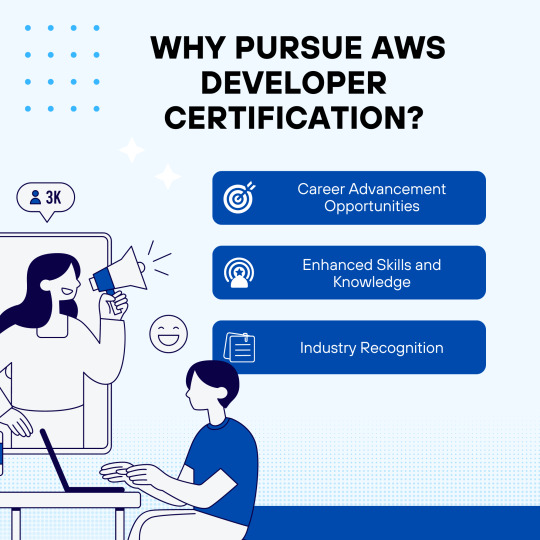
To become an expert in developing cloud applications on the Amazon Web Services (AWS) platform, enroll in our extensive AWS Developer Certification Training Course. Everything you need to pass the AWS Certified Developer Associate exam is covered in this course, including deployment methodologies, application development, security best practices, and AWS foundations.
0 notes
Text
Become a Successful Developer by Mastering AWS Developer Certification
In today's rapidly evolving digital landscape, cloud computing has emerged as a cornerstone technology, empowering businesses to scale, innovate, and stay competitive. Among the leading cloud service providers, Amazon Web Services (AWS) stands out as a pioneer, offering a comprehensive suite of cloud services to cater to diverse business needs. As organizations increasingly migrate their infrastructure and applications to the cloud, the demand for skilled AWS developers continues to surge.
To establish proficiency and credibility in AWS development, many professionals pursue AWS Developer Certification Training, specifically the AWS Certified Developer Associate certification. This certification validates expertise in developing and maintaining applications on the AWS platform, making it a highly sought-after credential in the industry.
Understanding the AWS Certified Developer Associate Certification
The AWS Certified Developer Associate certification is designed for individuals with experience in developing and maintaining applications on the AWS platform. It validates proficiency in key areas such as AWS services, SDKs, APIs, and the development lifecycle. By earning this certification, developers demonstrate their ability to design, deploy, and troubleshoot AWS-based applications with efficiency and reliability.
Why Pursue AWS Developer Certification?

Career Advancement Opportunities
In today's competitive job market, AWS Developer Certification serves as a powerful differentiator, setting certified professionals apart from their peers. Employers actively seek candidates with AWS certifications, recognizing their ability to deliver high-quality solutions on the AWS platform. Whether you're looking to advance in your current role or explore new career opportunities, AWS Developer Certification opens doors to a wide range of rewarding positions in cloud computing and software development.
Enhanced Skills and Knowledge
Preparing for the AWS Certified Developer Associate exam provides a comprehensive understanding of AWS services, best practices, and development methodologies. Through hands-on experience and study, candidates acquire valuable skills in building scalable, secure, and resilient applications on AWS. This knowledge not only enhances job performance but also equips developers to tackle complex challenges with confidence and efficiency.
Industry Recognition
AWS certifications are globally recognized and respected within the technology industry. Achieving AWS Developer Certification validates your expertise in cloud-native development and demonstrates your commitment to continuous learning and professional growth. Whether you're an aspiring developer or a seasoned IT professional, holding an AWS certification enhances your reputation and credibility among peers, employers, and clients.
AWS Developer Certification Training Roadmap
1. Familiarize Yourself with AWS Services
Start by gaining a solid understanding of core AWS services such as Amazon EC2, Amazon S3, Amazon RDS, AWS Lambda, Amazon API Gateway, and AWS DynamoDB. Explore the AWS Management Console and command-line interface (CLI) to navigate and interact with AWS resources effectively.
2. Dive into AWS Developer Tools and SDKs
Learn how to leverage AWS Software Development Kits (SDKs) and command-line tools to integrate AWS services into your applications seamlessly. Explore programming languages supported by AWS SDKs, including Python, Java, JavaScript, and .NET, and understand how to use them to interact with AWS APIs programmatically.
3. Master Application Development on AWS
Gain hands-on experience in designing, deploying, and managing applications on the AWS platform. Learn best practices for architecting cloud-native applications, optimizing performance, and ensuring security and compliance. Dive into topics such as serverless computing, containerization, and microservices architecture to build scalable and resilient applications in the cloud.
4. Explore DevOps Practices and Automation
Understand the principles of DevOps and continuous integration/continuous deployment (CI/CD) pipelines. Learn how to automate infrastructure provisioning, configuration management, and deployment processes using AWS services such as AWS CodePipeline, AWS CodeBuild, and AWS CloudFormation. Embrace infrastructure as code (IaC) practices to streamline application development and deployment workflows.
5. Prepare for the AWS Certified Developer Associate Exam
Enroll in AWS Developer Certification training courses and study materials to prepare for the certification exam. Leverage official AWS documentation, whitepapers, and practice exams to reinforce your knowledge and skills. Engage in hands-on labs and projects to apply theoretical concepts to real-world scenarios and solidify your understanding of AWS services and development best practices.
6. Test Your Knowledge and Skills
Regularly assess your progress by taking practice tests and quizzes to identify areas for improvement. Utilize online forums, study groups, and community resources to seek help and guidance from experienced professionals. Focus on mastering exam topics such as AWS SDKs, AWS CLI, AWS security best practices, AWS Identity and Access Management (IAM), AWS serverless technologies, and AWS database services.
7. Ace the Certification Exam
On exam day, approach the AWS Certified Developer Associate exam with confidence and composure. Manage your time effectively and carefully read each question to ensure clarity before selecting your answer. Draw upon your practical experience and exam preparation to tackle exam questions with precision and accuracy. Upon successful completion of the exam, celebrate your achievement and proudly display your AWS Developer Certification badge.
Conclusion:
AWS Developer Certification Training is a valuable asset for professionals seeking to advance their careers in cloud computing and software development. By mastering AWS services, tools, and best practices, certified developers demonstrate their ability to design, deploy, and maintain applications on the AWS platform with expertise and proficiency. Whether you're a seasoned developer or a newcomer to cloud technology, AWS Developer Certification opens doors to exciting career opportunities and enables you to make a meaningful impact in the world of cloud computing. Start your journey today and embark on the path to becoming an AWS Certified Developer Associate!
0 notes
Text
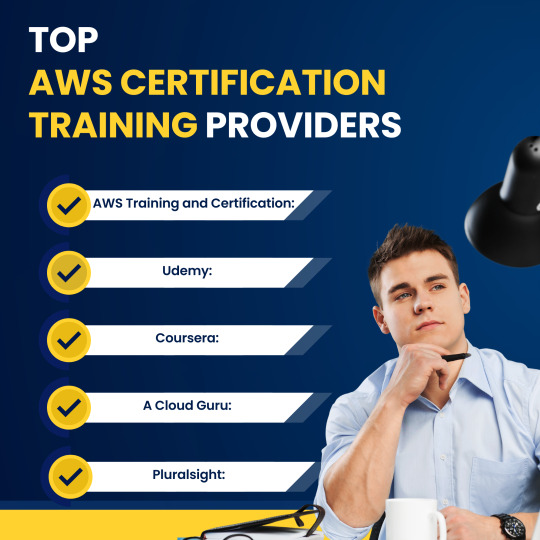
You may learn everything there is to know about AWS's fundamental services, such as computing, storage, networking, security, and more, by signing up for our AWS Certification Training Course. You will gain knowledge on how to manage AWS infrastructure effectively by using automation tools, optimizing performance, and designing scalable and resilient cloud solutions.
0 notes
Text
AWS Certification Training Courses: A Comprehensive Guide to Mastering AWS
Introduction:
In today's digital landscape, where cloud computing has become the backbone of modern businesses, mastering Amazon Web Services (AWS) is more crucial than ever. As the leading cloud services provider, AWS offers a plethora of services and solutions that empower organizations to innovate, scale, and succeed in the digital age. However, navigating the vast ecosystem of AWS can be daunting without the right knowledge and expertise. That's where AWS certification training courses come into play.
AWS certification is widely recognized as a benchmark of expertise in cloud computing. Whether you're a seasoned IT professional looking to upskill or a newcomer seeking to enter the cloud industry, earning an AWS certification can open doors to lucrative career opportunities. But with multiple certification paths and a myriad of services to master, choosing the right training course is paramount to your success.
In this comprehensive guide, we'll delve into the world of AWS certification training courses, exploring the benefits, certification paths, and top providers to help you kickstart your journey toward becoming an AWS-certified professional.
Understanding AWS Certification
AWS offers a range of certifications catering to various skill levels and job roles, from foundational to specialized tracks. These certifications validate technical skills and expertise in designing, deploying, and managing AWS solutions. The certification paths include:
1. Foundational Level: AWS Certified Cloud Practitioner
2. Associate Level: AWS Certified Solutions Architect, AWS Certified Developer, AWS Certified SysOps Administrator
3. Professional Level: AWS Certified Solutions Architect, AWS Certified DevOps Engineer
4. Specialty Certifications: AWS Certified Security, AWS Certified Advanced Networking, AWS Certified Machine Learning, and more.
Each certification path targets specific roles and skill sets, allowing individuals to specialize in areas that align with their career goals.
Benefits of AWS Certification Training Courses
1. Expert Guidance: AWS certification training courses are led by experienced instructors who provide expert guidance, practical insights, and hands-on labs to help you grasp complex concepts and real-world scenarios.
2. Comprehensive Curriculum: These courses cover a wide range of AWS services, best practices, and architectural principles, ensuring that you acquire the skills and knowledge needed to excel in your certification exam and real-world projects.
3. Interactive Learning: Many training providers offer interactive learning experiences, including live sessions, discussion forums, and group activities, fostering collaboration and knowledge sharing among peers.
4. Exam Preparation: AWS certification training courses include exam preparation materials such as practice tests, quizzes, and exam tips to help you feel confident and well-prepared on exam day.
5. Career Advancement: Earning an AWS certification can significantly enhance your career prospects, opening doors to high-paying job opportunities and career advancement within the rapidly growing cloud industry.
Top AWS Certification Training Providers
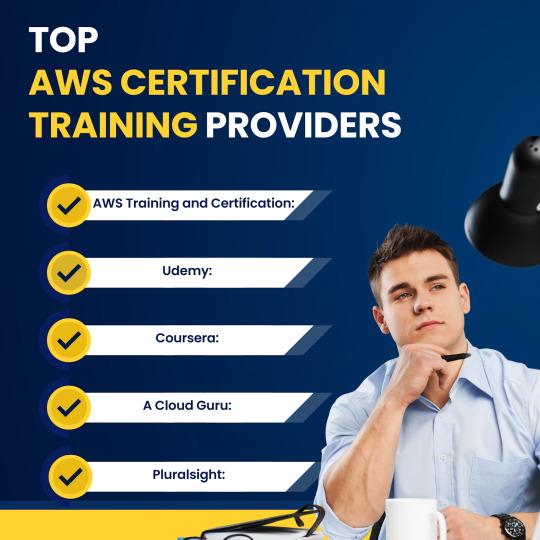
1. AWS Training and Certification: The official AWS Training and Certification platform offers a comprehensive range of courses designed by AWS experts. From self-paced online courses to instructor-led training, AWS Training and Certification provides flexible learning options to suit your schedule and learning style.
2. Udemy: Udemy hosts a plethora of AWS certification courses created by industry experts. With courses covering all certification paths and skill levels, Udemy offers affordable and accessible training options for individuals looking to enhance their AWS skills.
3. Coursera: Coursera partners with top universities and organizations to offer specialized AWS certification courses, including hands-on labs and projects. With flexible learning paths and guided projects, Coursera provides an immersive learning experience tailored to your skill level.
4. A Cloud Guru: A Cloud Guru specializes in cloud computing training, offering comprehensive AWS certification courses taught by industry professionals. With interactive labs, quizzes, and real-world scenarios, A Cloud Guru equips you with the skills and confidence needed to pass your AWS certification exam.
5. Pluralsight: Pluralsight offers on-demand AWS certification courses designed to help you master AWS services and prepare for your certification exam. With expert-led videos, assessments, and learning paths, Pluralsight enables you to learn at your own pace and track your progress effortlessly.
Conclusion:
Embarking on the journey to AWS certification can be a rewarding and transformative experience. Whether you're looking to advance your career, enhance your skills, or stay ahead of the curve in the competitive IT landscape, AWS certification training courses provide the knowledge, guidance, and resources you need to succeed.
By investing in AWS certification training, you're not only investing in your professional development but also positioning yourself as a trusted expert in cloud computing—an invaluable asset in today's digital-first world. So, why wait? Enroll in an AWS certification training course today and unlock endless possibilities in the world of cloud computing.
0 notes
Text
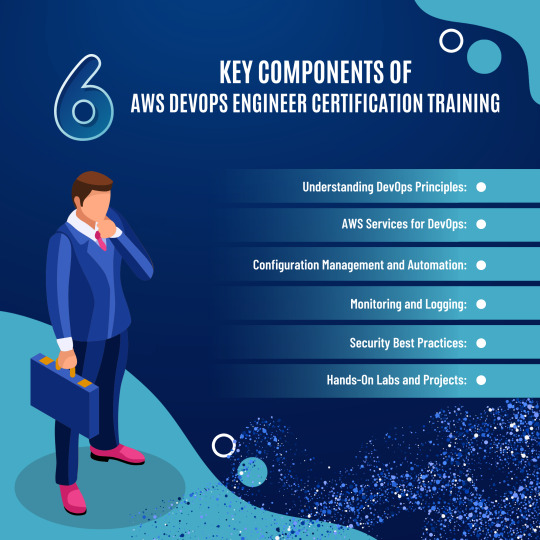
"Take advantage of our extensive training program to start your path toward becoming a certified AWS DevOps Engineer. Gain knowledge of DevOps techniques and AWS services through practical exercises and professional supervision. Develop your ability to automate infrastructure, maintain security, optimize performance, and construct CI/CD pipelines. Enroll in the AWS DevOps Engineer Certification Course right now!"
0 notes
Text
AWS DevOps Engineer Certification Training: A Comprehensive Guide to Mastering DevOps
In today's rapidly evolving tech landscape, DevOps has emerged as a crucial methodology for streamlining software development and deployment processes. As businesses strive to deliver products faster and more efficiently, the demand for skilled DevOps professionals continues to soar. Among the myriad of certifications available, the AWS DevOps Engineer certification training course stands out as a testament to expertise in deploying, operating, and managing applications on the AWS platform using DevOps principles.
Understanding the AWS DevOps Engineer Certification
What is DevOps?
DevOps, a portmanteau of Development and Operations, is a culture, set of practices, and combination of tools aimed at increasing an organization's ability to deliver applications and services at high velocity. It emphasizes collaboration, automation, and continuous integration and delivery (CI/CD) to achieve seamless software delivery and operational excellence.
The Significance of AWS in DevOps
Amazon Web Services (AWS) is a leading cloud computing platform that offers a wide range of services to help organizations build and deploy applications with speed, scalability, and reliability. Integrating AWS services with DevOps practices allows teams to automate infrastructure provisioning, deploy applications more efficiently, and scale resources as needed, thereby accelerating time-to-market and improving overall agility.
AWS DevOps Engineer Certification
The AWS DevOps Engineer certification validates one's expertise in implementing DevOps practices on the AWS platform. It is designed for professionals who have experience with AWS services and DevOps methodologies and wish to demonstrate their proficiency in deploying and managing applications on AWS using DevOps principles.
Key Components of AWS DevOps Engineer Certification Training
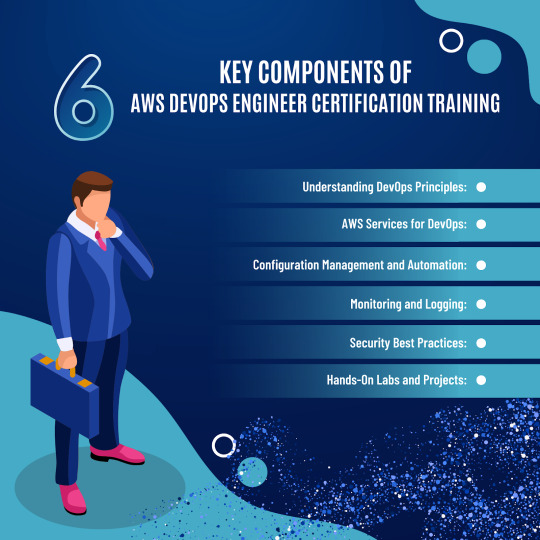
1. Understanding DevOps Principles:
AWS DevOps Engineer certification training begins with a comprehensive understanding of DevOps principles and practices. This includes concepts such as continuous integration, continuous delivery, infrastructure as code (IaC), and automation.
2. AWS Services for DevOps:
Participants delve into various AWS services that are integral to implementing DevOps practices. This includes AWS CodePipeline for automating the software release process, AWS CodeBuild for building and testing code, AWS CodeDeploy for automating application deployments, and AWS CloudFormation for provisioning and managing infrastructure as code.
3. Configuration Management and Automation:
Configuration management tools like AWS Systems Manager and AWS OpsWorks are explored to automate the configuration and management of AWS resources. Participants learn how to create and manage infrastructure as code using tools like AWS CloudFormation and AWS CLI (Command Line Interface).
4. Monitoring and Logging:
Effective monitoring and logging are crucial aspects of DevOps. Training covers AWS CloudWatch for monitoring AWS resources and applications, AWS CloudTrail for logging AWS API calls, and AWS X-Ray for tracing requests across distributed applications.
5. Security Best Practices:
Security is paramount in any DevOps environment. Participants learn about AWS Identity and Access Management (IAM) for managing user access to AWS services, AWS Key Management Service (KMS) for encrypting sensitive data, and AWS Web Application Firewall (WAF) for protecting web applications from common exploits.
6. Hands-On Labs and Projects:
Hands-on labs and projects are integral to AWS DevOps Engineer certification training. Participants get the opportunity to apply their knowledge in real-world scenarios, working with AWS services to build, deploy, and manage applications using DevOps practices.
Advantages of AWS DevOps Engineer Certification
1. Career Opportunities:
Earning the AWS DevOps Engineer certification opens up a plethora of career opportunities. DevOps engineers are in high demand across industries as organizations increasingly adopt DevOps practices to enhance their software delivery processes.
2. Recognition of Expertise:
The AWS DevOps Engineer certification serves as a validation of one's expertise in deploying and managing applications on AWS using DevOps principles. It enhances credibility and demonstrates a commitment to professional development.
3. Competitive Edge:
In today's competitive job market, having an AWS certification sets candidates apart from their peers. Employers value certifications as they demonstrate a certain level of proficiency and dedication to staying updated with the latest technologies and best practices.
Conclusion:
The AWS DevOps Engineer certification training course equips professionals with the knowledge and skills needed to excel in today's fast-paced DevOps environment. By mastering DevOps principles and leveraging AWS services effectively, certified professionals can drive innovation, accelerate software delivery, and contribute to the success of their organizations.
If you're ready to take your career to the next level and become a certified AWS DevOps Engineer, invest in quality training that provides a comprehensive understanding of DevOps principles, hands-on experience with AWS services, and preparation for the certification exam. With dedication and the right resources, you can embark on a rewarding journey toward becoming a proficient DevOps practitioner in the AWS ecosystem.
0 notes
Text
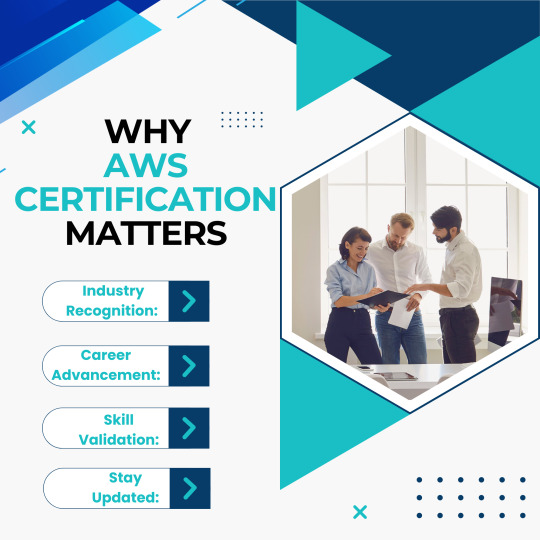
AWS certifications attest to a person's knowledge of cloud computing and show that they are skilled in developing, implementing, and overseeing AWS solutions. To accommodate a range of responsibilities and skill levels, AWS offers certifications at four different levels: Foundational, Associate, Professional, and Specialty.
0 notes
Text
Using Your AWS Certification to Unlock Career Opportunities
Introduction:
In today's rapidly evolving tech landscape, staying ahead of the curve is imperative for professionals looking to advance their careers in cloud computing. With the exponential growth of cloud services, particularly those offered by Amazon Web Services (AWS), acquiring the right skills and certifications has become paramount. AWS dominates the cloud market, making it a prime choice for individuals seeking to validate their expertise and credibility in the field. In this comprehensive guide, we'll delve into the significance of AWS certification, the various pathways available, and how it can propel your career to new heights.
Understanding AWS Certification
AWS certifications are industry-recognized credentials that validate expertise and proficiency in cloud computing. They are designed to validate technical knowledge and skills in various AWS services and solutions. With AWS certifications, professionals can demonstrate their ability to design, deploy, and manage AWS solutions effectively, making them highly sought after in today's job market.
Why AWS Certification Matters
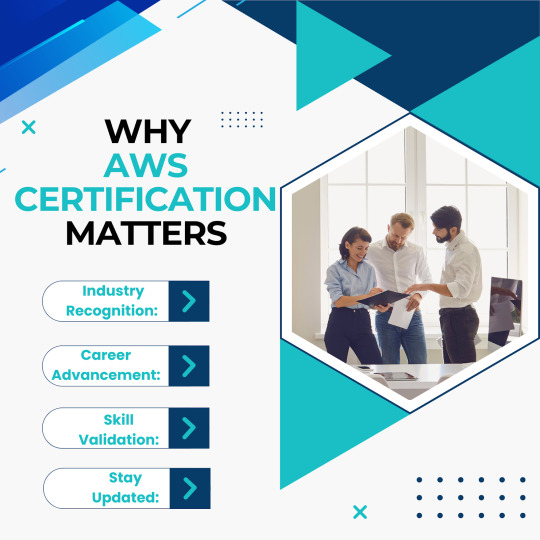
1. Industry Recognition: AWS certifications are globally recognized and respected in the IT industry. They serve as a testament to an individual's skills and expertise in cloud computing, providing credibility to employers and clients alike.
2. Career Advancement: In a competitive job market, AWS certification sets you apart from your peers. It not only increases your chances of landing lucrative job opportunities but also opens doors to career advancement and higher salary prospects.
3. Skill Validation: Earning an AWS certification validates your technical skills and proficiency in utilizing AWS services. It demonstrates your ability to architect, deploy, and manage AWS solutions, instilling confidence in employers regarding your capabilities.
4. Stay Updated: AWS certifications require candidates to stay updated with the latest trends and technologies in cloud computing. By pursuing certification, professionals ensure that their skills remain relevant in a rapidly evolving industry.
AWS Certification Pathways
AWS offers a diverse range of certification paths catering to different job roles and skill levels. Here are some of the popular AWS certification tracks:
1. AWS Certified Solutions Architect: This certification validates expertise in designing and deploying scalable, fault-tolerant systems on AWS. It is ideal for professionals involved in designing distributed applications and systems on the AWS platform.
2. AWS Certified Developer: Targeted towards individuals responsible for developing and maintaining applications on AWS, this certification validates proficiency in writing code that optimizes AWS services.
3. AWS Certified SysOps Administrator: This certification focuses on system operations roles, validating technical expertise in deploying, managing, and operating scalable, highly available, and fault-tolerant systems on AWS.
4. AWS Certified DevOps Engineer: Aimed at professionals working in DevOps roles, this certification validates expertise in provisioning, operating, and managing distributed application systems on AWS.
5. AWS Certified Solutions Architect – Professional: An advanced certification for experienced Solutions Architects, this validates advanced technical skills and expertise in designing distributed systems on AWS.
6. AWS Certified Advanced Networking: This certification validates advanced networking skills on AWS, ideal for professionals responsible for designing and implementing complex networking architectures on the platform.
How to Prepare for AWS Certification
Preparing for AWS certification requires a combination of study, hands-on experience, and practical knowledge. Here are some steps to help you get started:
1. Select the Right Certification: Choose a certification that aligns with your career goals and expertise level. Whether you're a beginner or an experienced professional, there's a certification track suited to your needs.
2. Enroll in an AWS Course: Consider enrolling in a reputable AWS course to gain in-depth knowledge of AWS services and solutions. Look for courses that offer hands-on labs, practice exams, and expert guidance to help you prepare effectively.
3. Hands-on Experience: Practice is key to success in AWS certification exams. Take advantage of AWS's free tier to experiment with different services and build real-world projects. Hands-on experience will reinforce your understanding of AWS concepts and prepare you for exam scenarios.
4. Study Resources: Utilize a variety of study resources such as official AWS documentation, whitepapers, online tutorials, and practice exams. Familiarize yourself with the exam guide and focus on key topics outlined in the syllabus.
5. Join AWS Communities: Engage with the AWS community through forums, discussion groups, and social media channels. Networking with fellow professionals and sharing experiences can provide valuable insights and support during your certification journey.
Conclusion:
In conclusion, AWS certification offers a pathway to career advancement and professional growth in the ever-expanding field of cloud computing. Whether you're a seasoned IT professional or just starting your career journey, AWS certification can significantly enhance your marketability and credibility in the industry. By investing time and effort into acquiring AWS certifications, you not only validate your expertise but also position yourself as a valuable asset to organizations seeking skilled cloud professionals. Take the first step towards unlocking new career opportunities with AWS certification today!
Whether you're aiming for an associate-level certification or aspiring to become an AWS Certified Solutions Architect Professional, there's a certification track tailored to your career goals and expertise level. Start your AWS certification journey today and embark on a path toward career success in cloud computing.
0 notes
Text
Mastering DevOps: Your Guide to DevOps Certification Training Courses
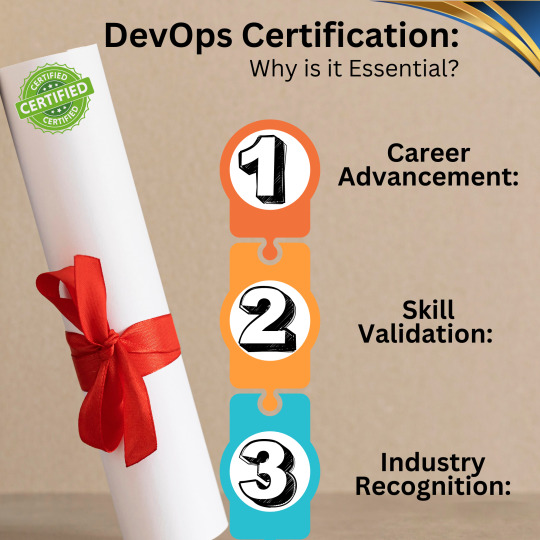
With the help of our extensive DevOps Certification Training Course, unleash the power of DevOps. To advance your career in the fast-paced field of information technology, get practical experience and become proficient in key DevOps technologies, processes, and approaches. Become a certified DevOps practitioner by enrolling now!
0 notes